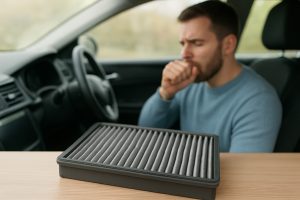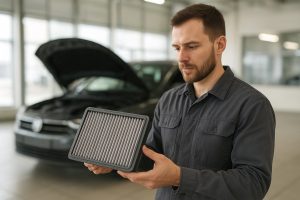Modern vehicles are not just machines for transportation; they are enclosed environments where drivers and passengers spend significant amounts of time. Air quality inside the cabin is a crucial factor that impacts your comfort and long-term health. One small but powerful component that ensures clean air is the cabin air filter. While many drivers think of it as just another replaceable part, its role in protecting you from pollutants, allergens, and harmful particles is far more important than it appears.

What Is a Cabin Air Filter?
A cabin air filter is installed in the ventilation system of a vehicle, typically behind the glove box or under the dashboard. Its main purpose is to filter the air entering the cabin through the heating, ventilation, and air conditioning (HVAC) system.
Cabin air filters are usually made from pleated paper or fiber material, sometimes enhanced with activated carbon to absorb odors and harmful gases.
How Cabin Air Filters Improve Health
1. Blocking Allergens and Pollen
For allergy sufferers, driving with the windows closed doesn’t guarantee protection from pollen. Cabin air filters trap microscopic allergens before they enter the car, significantly reducing sneezing, watery eyes, and respiratory irritation.
2. Filtering Dust and Particulate Matter
Road dust, brake particles, and tire debris can all make their way into the car without proper filtration. These fine particles may cause respiratory issues, especially for children and individuals with asthma.
3. Removing Harmful Gases
Advanced cabin air filters with activated carbon can trap nitrogen oxides, ozone, and volatile organic compounds (VOCs) from exhaust fumes. Long-term exposure to these pollutants can negatively impact cardiovascular and lung health.
4. Preventing Mold Growth in HVAC Systems
A clean filter reduces the risk of moisture buildup in the HVAC system, which can otherwise encourage mold growth — a common source of bad odors and respiratory issues.
Recommended Replacement Intervals
Although many car manufacturers suggest replacing the cabin air filter every 12,000–15,000 miles (20,000–24,000 km) or at least once a year, real-world driving conditions can shorten its lifespan.
Factors that require more frequent replacement:
-
Driving in dusty or polluted areas
-
Regular stop-and-go urban driving
-
High pollen seasons
-
Off-road driving
Symptoms of a Dirty Cabin Air Filter
If your cabin air filter is overdue for replacement, you may notice:
-
Reduced airflow from vents
-
Persistent unpleasant odors
-
Foggy windows due to poor air circulation
-
Increased allergy or asthma symptoms inside the car
Table: Cabin Air Filter Types and Their Benefits
| Filter Type | Main Feature | Best For |
|---|---|---|
| Standard Paper Filter | Traps dust and pollen | Everyday driving in low-pollution areas |
| Activated Carbon Filter | Absorbs odors and harmful gases | Urban driving, heavy traffic, pollution |
| HEPA Filter | Removes ultra-fine particles | Allergy sufferers, sensitive health needs |
Real-World vs. Manufacturer Recommendations
While manufacturer guidelines provide a baseline, real-world driving often exposes the filter to higher levels of contaminants. It’s best to inspect your cabin filter every 6 months and replace it if visibly dirty — even if the mileage interval isn’t reached.
How to Replace a Cabin Air Filter

-
Locate the Filter Compartment – Usually behind the glove box or under the hood near the windshield.
-
Remove the Cover – This might require unscrewing or unclipping a panel.
-
Take Out the Old Filter – Be careful not to shake it to avoid releasing trapped particles.
-
Insert the New Filter – Ensure it’s positioned according to the airflow direction arrow.
-
Reattach the Cover – Secure it firmly and test airflow.
This process often takes less than 15 minutes and can be done with minimal tools.
The Bottom Line
Cabin air filters are far more than a comfort feature — they are your first line of defense against airborne pollutants while driving. Clean filters ensure healthier breathing, improved HVAC performance, and a fresher cabin environment.
Don’t wait for noticeable symptoms to appear. Regular replacement is a small investment with big health benefits.
You can easily find high-quality replacement options here: buy Cabin Air Filters online and ensure that every journey you take is a breath of fresh air.